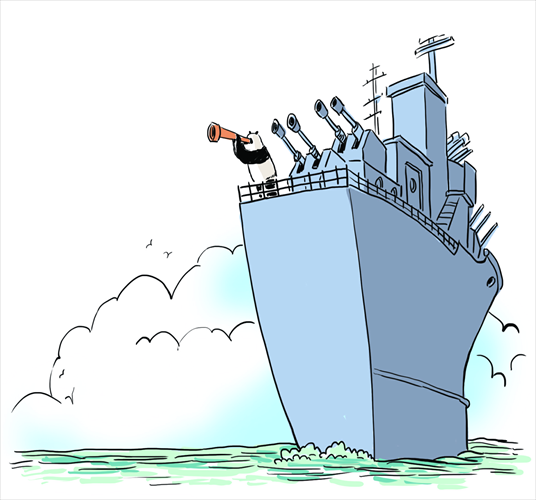Military transparency good, but clear budget data better

China issued the white paper The Diversified Employment of China's Armed Forces on April 16, elaborating its concept of the security and employment of armed forces in peacetime.
China's international standing and needs of protecting its security and development interests require a modern and professional national defense. This white paper has mirrored China's desire and methods to meet arising challenges.
There is a change of tone in this white paper that we need to pay attention to. "We will not attack unless we are attacked, but we will surely counterattack if attacked." In the face of the rhetorical shift in US foreign policy toward the Asia-Pacific region and the unshelved territorial conflicts, China is clearly expressing its stance, namely, the protection of its territorial integrity and counter-containment as the cornerstones of national defense.
In this paper, there are several points that catch the eye. The paper highlights China's increasing international participation in trade, investments and the importance of its overseas interests. "With the gradual integration of China's economy into the world economic system, overseas interests have become an integral component of China's national interests," the paper states.
Security issues are prominent now for China, including the safety of overseas Chinese nationals and economic interests, such as energy and resources overseas, as China is participating in rescue missions and disaster relief.
However, the paper has not given any details about the building of capacities that can conduct extraterritorial operations.
The first chapter of this white paper states that on the whole the world situation is stable, though, it is far from peaceful. Both the US and Japan are mentioned in terms of the new situation that has emerged in the Asia-Pacific region. Since the US adjusts its Asia-Pacific policy, this region has experienced profound changes. The paper also calls Japan a "troublemaker" in the dispute over the Diaoyu Islands. But defense and diplomatic issues sometimes can be worlds apart.
For China, the US and Japan are necessary partners in terms of resolving the regional hot-spot issues, such as the rising tensions around the North Korean nuclear issue. All the three countries play important roles in the regional economic cooperation and stability. One country alone cannot deal with the regional problems. However, in the past months, the territorial dispute between China and Japan has stirred up long-standing resentments in the public.
And the US pivot to Asia policy also triggers China's concern. Indeed, according to the paper, "a certain country has strengthened its Asia-Pacific military alliances, expanded its military presence in the region, and frequently makes the situation there tenser." Yet, cooperation between the US and China in East Asia is regaining its feet. Geopolitical and great power tactics have indeed proven disadvantages for the region as a whole.
The three countries need to implement concrete solutions and dialogues for regional security. Also, in the mid term, regional disputes necessitate strong regional forums that can address and eventually find viable solutions for all parties involved.
In the past years, China's military transparency has been a frequently discussed problem. This paper is more detailed than before, revealing the 18 combined corps of People's Liberation Army, the number of army servicemen and additional independent combined operational divisions. However, the key of military transparency is reliable information of China's defense spending. It will still cause doubts from other countries if they feel uncertain about the exact application of funds and intentions and motives of rises in budget.
In terms of maritime power, the most important thing is how to project this kind of maritime power properly in order to defend China's interests and deal with strategic imperatives. China also has to articulate its intent to safeguard its maritime power.
China's rising maritime power will necessarily cause worries from other countries, particularly littoral states in the Southeast Asia. Therefore, there is a need for China to explain how it will become a responsible maritime power in the Asia-Pacific region and how it intends to safeguard the interests of all states.
The article was compiled by Global Times reporter Zhao Nan based on an interview with Bernt Berger, research fellow and Head of the Asia Program at the Institute for Security and Development Policy, Stockholm. zhaonan@globaltimes.com.cn